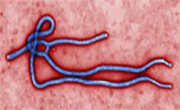
TUESDAY, April 14, 2015 (HealthDay News) — The Ebola virus has evolved but hasn’t become more lethal since the first outbreak 40 years ago, a new study suggests.
British researchers conducted a computer analysis of data from every outbreak since 1976 and found that a number of genetic changes have occurred in the Ebola virus, but those changes haven’t made it more or less deadly.
The findings suggest that the high death toll in the current outbreak in West Africa — the largest to date at about 10,500 fatalities — is not due to mutations or evolution making the virus more deadly or infectious, according to the investigators.
The results “mean the Ebola virus that has now emerged on several occasions since the 1970s will very probably do so again,” said Simon Lovell, a professor in the faculty of life sciences at the University of Manchester.
“It’s only through such close monitoring that we will contain it and ultimately eradicate it,” he said in a university news release.
David Robertson, another professor in life sciences at Manchester, said there are positives to the findings published in the April issue of the journal Virology.
“The fact that Ebola isn’t changing in a way that affects the virulence of the disease means that vaccines and treatments developed during this current outbreak have a very high chance of being effective against future outbreaks,” he said in the news release.
“It also means that methods to successfully tackle the virus should work again, so hopefully in the future an outbreak can be stopped from spreading at a much earlier stage,” Robertson added.
Tony Redmond, a professor at the university’s Humanitarian and Conflict Response Institute, said, “Like any medical response, the response to Ebola must be supported by science. These are very important findings and emphasize that the spread of the virus in this outbreak owed as much to factors within the human community than within the virus itself.”
More information
The U.S. Centers for Disease Control and Prevention has more about Ebola.
Copyright © 2026 HealthDay. All rights reserved.

